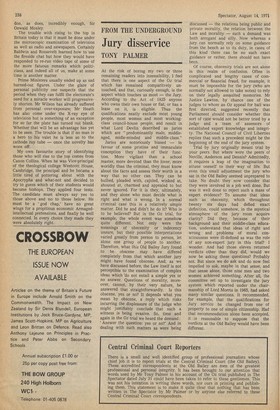FROM THE UNDERGROUND
Jury disservice
TONY PALMER
At the risk of boring my two or three remaining readers into insensibility, I feel that there is one aspect of the Oz trial which has remained comparitvely untouched, and that, curiously enough, is the aspect which touches us most — the Jury. According to the Act of 1825 anyone who owns their own house or flat, or has a lease on it, is eligible. Thus the qualifications neatly exclude most young people, most women and most workingclass council-house people, and result in what Lord Devlin described as juries which are "predominantly male, middleaged, midle-minded and middle. class."
Juries are notoriously biased — in favour of some pristine and immaculate conception they have of their function. More vigilant than a school master, more devoted than the lover, more worldly than the criminal, they must know about the facts and assess their worth in a way that no other can. They can be bullied, pleaded with, cajoled, winked at, shouted at, charmed and appealed to but never ignored. For it is they, ultimately, and they alone who must decide what is right and what is wrong. In a normal criminal case this is a relatively simple matter. Did he and didn't he do it? Who is to be believed? But in the Oz trial, for example, the whole event was somehow quite different. Not only were the meanings of obscenity or indecency unsure, but their possible interpretations varied greatly from person to person, let alone one group of people to another. Therefore, what this Old Bailey Jury found to be obscene may have differed completely from that which another jury might have found obscene. And, as we have discussed before, the Law itself is not perceptible to the examination of complex ideas which 'do not entail a simple yes or no answer. Questions of morality, moreover, cannot, by their very nature, be answered that straightforwardly. Is this obscene, yes. or no? It depends what you mean by obscene, a reply which risks incurring the displeasure of the judge who might justifiably conclude that such a witness is being evasive. So, time and again in the Oz trial we heard the demand : 'Answer the question; yes or no?' And in dealing with such matters as were being
discussed — the relations being public and private morality, the relation between the Law and morality — such a demand was both arrogant and silly. Now whereas a jury can normally rely on some guidance from the bench as to its duty, in cases of this kind there can be no such exact guidance or rather, there should not have been.
Of course, obscenity trials are not alone in this realm of confusion. Often in complicated and lengthy cases of commercial or financial fraud, for example, it must he impossible for the jury (who are normally not allowed to take notes) to rely on their legally assaulted memories. Mr Justice Lawton, by chance one of the judges to whom an Oz appeal for bail was first directed, suggested recently that Parliament should consider whether this sort of case would not be better tried by a judge and a team of assessors of established expert knowledge and integrity. The National Council of Civil Liberties replies that such a precedent might be the beginning of the end of the jury system.
Trial by jury originally meant trial by your peers. But where were the peers of Neville, Anderson and Dennis? Admittedly, it requires a leap of the imagination to attune oneself to their way of life. But even this small adjustment the jury who sat in the Old Bailey seemed unprepared to take. No doubt they now consider that they were involved in a job well done. But was it well done to reject such a mass of expert evidence? To assume that ideas such as obscenity, which throughout twenty six days had defied exact definition, could somehow, in the mystical atmosphere of the jury room acquire clarity? Did they, because of their background and their middle-class education, understand that ideas of right and wrong and problems of moral consciousness were ill-defined as was the role of any non-expert jury in this trial? I wonder. And had those eleven returned verdicts other than they did, would we now be asking these questions? Probably not. But since we do ask and do now feel impelled to ask, maybe in that sense, and that sense alone, those nine men and two women achieved something. After all, the committee set up to investigate the jury system which reported under the chairmanship of Lord Morris in 1965, had asked many similar questions. It recommended, for example, that the qualifications for Jury service be changed from one of property to one of simple citizenship. Had that recommendation alone been accepted, it is reasonable to suppose that the verdicts at the Old Bailey would have been different.


































 Previous page
Previous page